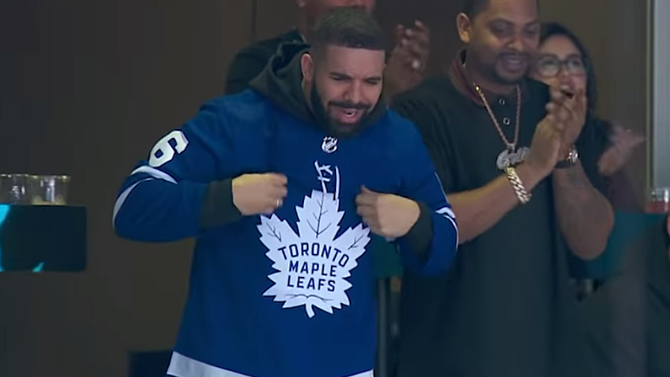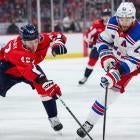The Toronto Maple Leafs are out.
It was the same junk, different pile for the Leafs this year. Another promising season capped by yet another first-round exit -- and once again it came down to a Game 7 in Boston. Ultimately, it was the Bruins who kept the carousel spinning with a win on home ice to send the Leafs packing.
After signing prized free agent John Tavares over the summer, Toronto came into the season as Stanley Cup betting favorites. So how did we get here, talking about another one-and-done postseason run? Let's break down where things went wrong for the Leafs.
Mike Babcock
Let's get this one out of the way first since it's freshest on the mind. Toronto's six million dollar coach had a promising start to the series and seemed to be out-maneuvering Boston's Bruce Cassidy with matchups and adjustments, but some of his decisions later on in the series were...questionable. And that's being polite.
We could take a deep dive into some of the line shuffling in Game 7, but let's keep it simple for the sake of brevity. Here's pretty much all you need to know:
- John Tavares...21:19
- Mitch Marner...20:52
- Auston Matthews...18:48
Those are the final TOI numbers for Toronto's three best forwards in a do-or-die Game 7 -- a Game 7 in which the Leafs trailed for about 55 minutes. Those are essentially regular season numbers for the Leafs' elite forwards, who by the way were very good in this series.
Instead of giving his best players extra run, Babcock instead kept rolling his bottom-six forwards in Game 7, even as Leafs trailed by two goals in the final 15 minutes of action. I just can't comprehend why that happened, especially after the Leafs were outright dominant in the second period of play with the Tavares line leading the way.
John Tavares line tonight through 40 minutes:
— Jonas Siegel (@jonassiegel) April 24, 2019
Shot attempts: 16-6
Shots: 11-3
Scoring chances: 12-3
Babcock has gotten quite a bit of heat for how he deploys his best players (specifically Matthews and the first power play unit) over the past couple of years, but his approach to Game 7 has to be one of the most unforgivable and infuriating instances in that regard.
And oh by the way, that's five straight first-round exits for Babcock. Just a little something to think about.
Special teams
When you look at this series as a whole, it feels fair to say that the Maple Leafs were the better team, especially at five-on-five. But special teams played a huge factor, as they often do in the postseason, and that advantage skewed to Boston.
The Bruins had some quiet games from the front end of their lineup, but they were able to make up for that by shredding Toronto on the man advantage. Boston went 7-for-16 (43.8 percent) on the power play in the series, and a number of those goals came at huge moments.
The most notable came in Game 6. With a chance to knock out the Bruins on home ice in Toronto, the Leafs jumped out to an early lead with a goal from Morgan Rielly about halfway through the first period. The Leafs had momentum on their side and the crowd behind them, but the Bruins went on the power play less than two minutes later and immediately answered, and a handful of minutes after that, they scored another power play goal to take a 2-1 lead they never gave back.
The Leafs' inability to limit the Bruins on the PK was a killer both mentally and on the scoreboard. Toronto's own man advantage wasn't bad (3-for-16 in the series) but they were still significantly outmatched by Boston in that department.
Goaltending
Off the top here, the goaltending in this series was pretty solid all-around. There were a few softies on both ends, but it was a much better overall showcase from Tuukka Rask and Frederik Andersen than the one we saw last postseason.
However, the biggest advantage came in Game 7 when Tuukka Rask stood on his head for the Bruins, stopping 32 of 33 shots against. Rask, who often gets flak in Boston for "not being a big game performer," was the Bruins' best player in that do-or-die finale.
On the other end, Freddie Andersen's first goal allowed looked like this.
Joakim Nordstrom? JOAKIM NORDSTROM! (thanks Freddie) pic.twitter.com/MUqRxpEbYP
— Pete Blackburn (@PeteBlackburn) April 23, 2019
That's a terrible goal to give up in a pivotal spot, but it's hard to hold it against him too much considering he made up for it with this incredible stop.
What a damn save by Freddie pic.twitter.com/4cgvr9oxJz
— Pete Blackburn (@PeteBlackburn) April 24, 2019
In the end, it's safe to say that Rask was slightly better, finishing the series with a .928 save percentage, while Andersen had a solid .922. In a series this close, that small percentage can mean a whole lot.
Those damn demons
These two teams obviously have a bit of history and it doesn't particularly favor Toronto. After all, this is largely the same Toronto team that took Boston to seven games last year, then added John Tavares and Jake Muzzin to the lineup. That's gotta count for more than historical narrative, right?
But I also said from the beginning that the Leafs did themselves a major disservice by not locking up home ice with the No. 2 seed in the Atlantic. Their inconsistencies during the regular season cost them that luxury (probably shouldn't have lost to the Senators THREE TIMES) and it's hard not to wonder if things would have gone differently had they owned home ice in the finale.
And given the way it played out, it's getting harder and harder to push away the idea that Toronto may actually be cursed in Boston. Goals from Joakim Nordstrom, Marcus Johansson and Sean Kuraly buried the Leafs' season. Tuukka Rask turned into a brick wall. Mike Babcock lost his mind.
I'm not telling you that you have to buy in, but the signs are there.
No. 5























